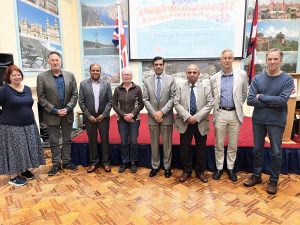The Britain Nepal Medical Trust was established in 1967 by a group of young doctors (from St Thomas’) who had an ambition of doing something of value in a part of the world where their medical skills were more urgently required than UK. They departed overland – excited and inspired by the opportunity of working in the mountains of the Himalaya – and on arrival they were sent to Biratnagar to run the regional hospital.
Hungry for the mountains – a couple of the team headed off north and within a year the BNMT programme had expanded into the hill districts of the eastern Region – starting with a BCG programme they rapidly expanded into tuberculosis control – an area which we continue to play and active part today.
And from those small beginnings – 45 years on - BNMT now stands as:
- one of the first INGOs to work in Nepal
- one of the longest serving INGOs in Nepal
- with a strong track record of working in partnership with the National TB programme in TB control – bringing in some of the worlds most famous experts over the years – including Sir John Crofton, Dr Wallace Fox and Dr Knut Ovreberg..
- a world leader in piloting models of essential drug supply to rural areas – to ensure a year round supply of essential drugs
- an early implementer of community health and development programmes – training of CHWs/CHVs – which evolved in to FCHVs, with a focus on female literacy, savings funds, income generation projects, nutrition, water supply and sanitation as part of an approach to tackling the wider determinants of health
- international recognition for our work on health rights – with disadvantaged groups – and a focus of advocacy, community and social mobilization
- recognized for its commitment to partnership working across a broad spectrum of organizations – MOHP, community based organizations, INGOs, NTP, multilateral and bilateral donors and communities.
We work under an agreement with the Government of Nepal and in association with other local NGOs in all five regions of the country.
Our programmes extend to around a fifth of Nepal's 27 million population.

